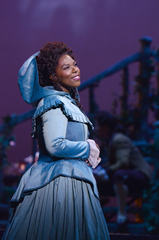| Opera Reviews | 12 May 2024 |
Michelle Johnson soars as Manon Lescautby Steve Cohen |
|
| Puccini: Manon Lescaut Opera Company of Philadelphia April 2012 |
|
|
Johnson is still a student (a so-called "resident artist") at the Academy of Vocal Arts. She has been impressive in Verdi's Falstaff, Verdi's Oberto and Puccini's Suor Angelica, but this role taxes the abilities of seasoned professionals to a greater extent, and she carried it off with aplomb. She provides the latest evidence that the AVA prepares singers superbly for professional careers. Johnson had three weeks to learn the role and rehearse it after Ermonela Jaho withdrew from her announced assignment. Vocally, Manon needs to sing the plaintive arias for which Puccini is famous, plus trills and high passages not present in other Puccini scores, and some heavy dramatic singing beyond what's demanded for Mimi or Butterfly. This heroine must progress dramatically from an innocent to a pampered call girl, then a convicted felon who is deported to Louisiana and dies. Johnson embodied all this with no sense of effort. She seemed to inhabit the role and her voice floated splendidly. That being said, the Puccini version of the life of Manon Lescaut is less varied, and less dramatically challenging, than the earlier rendition of the story by Jules Massenet, which we just reviewed from the Met. In Massenet's adaptation of the Abbé Prévost novel, the protagonist is shown as a naive 15-year-old getting off a carriage that was bound for a nunnery, then she goes to live with the youthful Des Grieux in a modest Parisian apartment. Puccini skips all that, introduces Manon to us at a fancy ball and in the next scene he shows her as the kept woman of the wealthy Brétigny. So there's less variety and less of a dramatic arc. Puccini also eliminated the powerful scene where Manon seduces Des Grieux in a church. Contemplating those cuts, you well may question why many opera fans prefer the Puccini. The reason is that the Italian composer emphasized the love story of Manon and the young chevalier, and gave them more arias and duets of sentimentality and passion. While Puccini skipped over much of Manon's journey, he dwelled at length on her desperate later days. Massenet's music line rose and fell in small steps, ebbing and flowing, as if to say, with a shrug, "That's the way the world is." Puccini's surged with more extroversion. Johnson was a visual knockout from her first appearance in a robin's egg silk dupioni with a corseted bodice. She looked not at all like a schoolgirl on her way to a convent, but that wasn't what was called for in this version. In the second act, in Brétigny's palace, she wore a tall wig and a peach gown with gold floral embroidery and flounced sleeves and was a vain showoff, just as she's supposed to be. Her narcissism impelled her to linger too long in her bedroom, gathering her jewelry; therefore she was arrested before she could leave. Her love interest was played by the Brazilian tenor, Thiago Arancam, who looked handsome (resembling baseball pitching star Cole Hamels.) He used a tight-throated method that's called pharyngeal singing, putting pressure on every note. There's a constant sense of hard work and no relaxation. It reminded me of the faddish way of speaking called vocal "fry" which is favored by many young women, producing a metallically grating sound. Troy Cook as Manon's brother, and Daniel Mobbs as her super-rich patron, acted and sang well. Corrado Rovaris conducted with suitably broad tempi. Millie Hiibel created the luxurious costumes, while Michael Cavanagh directed the production that was designed by John Pasco originally for the Washington National Opera. One of its nice touches was the projection of pages from a book, presumably from Prévost's novel, setting the scenes. The production also boasted a large replica of the ship that took Manon to America, and crowd scenes swirled effectively across the stage. |
|
| Text ©
Steve Cohen Photo © Opera Company of Philadelphia |

 The
best thing about this Philadelphia Manon Lescaut was Michelle
Johnson in the title role, and that's saying a lot because the production
was attractive and clever in many ways.
The
best thing about this Philadelphia Manon Lescaut was Michelle
Johnson in the title role, and that's saying a lot because the production
was attractive and clever in many ways.





